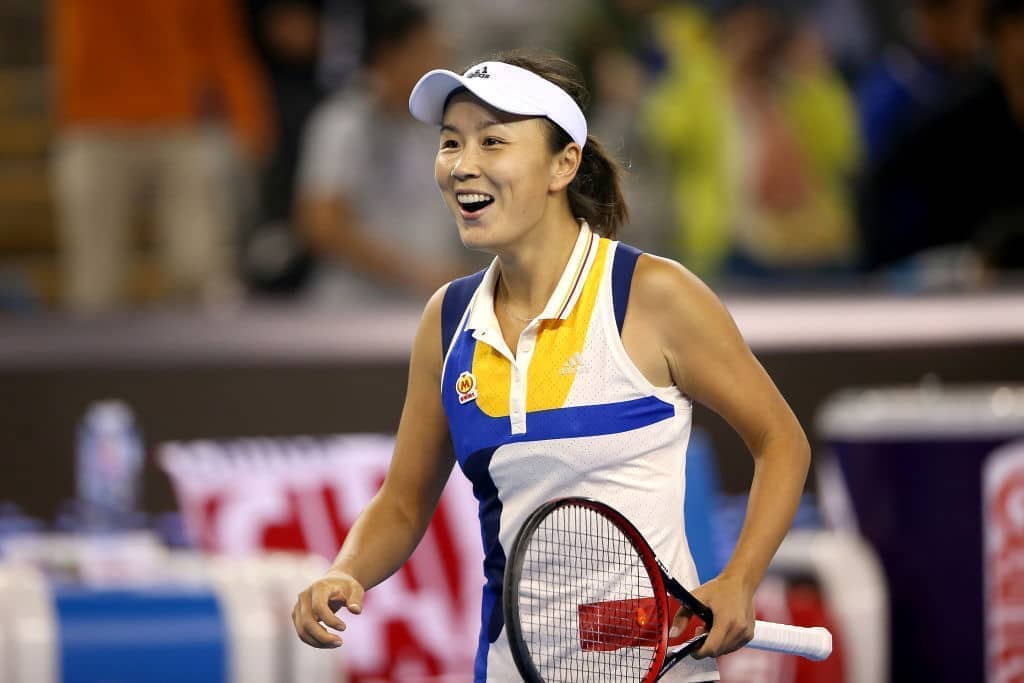Serena Williams has joined the growing ranks of international tennis stars expressing concern over the disappearance of Peng Shuai. The former world No. 1 said she was ‘devastated and shocked’ about the plight of the Chinese tennis star, who has not been seen since she accused a senior Communist party official of sexual assault.
The Women’s Tennis Association (WTA) said it was prepared to pull its tournaments out of China if it does not get satisfactory answers. ‘This is bigger than business. Women need to be respected and not censored,’ said chairman Steve Simon. He was demonstrating something altogether too rare in dealings with China – a willingness to put moral principle ahead of the lucrative Chinese market.
Peng Shuai is one of the most recognisable faces in Chinese sport. On 2 November, she alleged on her Weibo social media account that Zhang Gaoli, a former vice-premier and member of the seven-strong Standing Committee of the Party’s Politburo, the country’s highest ruling group, had assaulted her. The post was removed by censors within 20 minutes, and Peng’s account was blocked, though other users continued to share screenshots of her post. In a desperate effort to prevent people searching and to close down the conversation, the censors added ‘tennis’ to a list of banned words.
‘I’m not missing, nor am I unsafe. I’ve just been resting at home and everything is fine’
The WTA has demanded Peng’s allegations be ‘investigated fully, fairly, transparently and without censorship’, while friends and colleagues unable to reach her have grown increasingly concerned about her welfare. The hashtag #WhereIsPengShuai has been trending on Twitter. Top tennis stars, past and present, have spoken out. ‘Honestly, it’s shocking,’ said Novak Djokovic, while Naomi Osaka tweeted, ‘Censorship is never OK at any cost, I hope Peng Shuai and her family are safe and OK. I’m in shock of the current situation and I’m sending love and light her way’. The Association of Tennis Professionals (APT) also called for a ‘full, fair and transparent investigation’.
The growing international concern has now been compounded by what appears to be a clumsy attempt by the Party to cover-up both the allegations and her troubling disappearance. An email, supposedly from Peng, was published by CGTN, the international arm of China’s state broadcaster. ‘Hello everyone this is Peng Shuai,’ it began. ‘Regarding the recent news released on the official website of the WTA, the content has not been confirmed or verified by myself and it was released without my consent. The news in that release, including the allegation of sexual assault, is not true. I’m not missing, nor am I unsafe. I’ve just been resting at home and everything is fine. Thank you again for caring about me.’
The ‘email’ was a screenshot – the cursor could still be seen in the picture. The WTA was not impressed. ‘The statement released today by Chinese state media concerning Peng Shuai only raises my concerns as to her safety and whereabouts,’ said Steve Simon. ‘I have a hard time believing that Peng Shuai actually wrote the email we received or believes what is being attributed to her.’ He demanded concrete evidence that she is safe.
To those familiar with Communist party ‘justice’, the tactics are familiar: the arbitrary detention of critics, followed by forced or concocted statements of repentance or guilt. These have become significantly more common under Xi Jinping. In the case of Peng, they did not appear to be her freely spoken words, and were especially dubious in the absence of video or photographs.
The Party has grown used to being able to intimidate critics, especially those who do business in China. It did not perhaps fully appreciate the depth of international concern and support for Peng from fellow tennis players and their professional bodies. In 2014, Peng was the first Chinese player to be ranked the world’s No. 1 in doubles. She reached No. 14 in singles, and is a familiar and well-liked face on the global tennis circuit.
Neither did Peng’s allegations against a top Party official came as any surprise to those familiar with the male-dominated culture of power and impunity in China. The Party’s response shows its extreme sensitivity, and also reveals the limits of China’s fledgling #MeToo movement when it threatens the pinnacles of power.
The tennis community has shown a welcome backbone in confronting the Party. Too many other professional sports bodies, from the NBA to the International Olympic Committee, have shrunk away from anything that might provoke Beijing and jeopardise their income from China. The IoC is especially spineless. On Thursday it said it preferred ‘quiet diplomacy’ in dealing with China, which usually translates into doing nothing at all. If Beijing is not willing to show that Peng is safe, then the IoC seems certain to come under pressure to act, with the Winter Olympics less than three months away.
Perhaps newly-minted British tennis star Emma Raducanu might use her influence to further Peng’s case. Raducanu has a Chinese mother and speaks fluent Mandarin. After winning the US Open, she thanked in Mandarin her growing legion of fans in China. She launched her own Weibo account, and a video message she posted had more than one million views in less than two days. She would appear to be in a good position to use her new celebrity in China to help a persecuted fellow player.







Comments